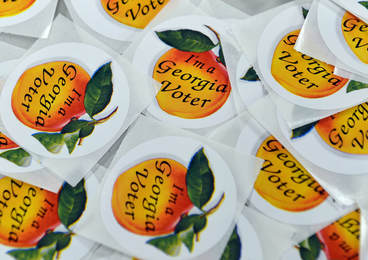|
By Sam Burnham @C_SamBurnham  As promised in my previous post, I want to discuss Georgia acquiescing to big government. I discussed this topic in an op-ed commentary on GPB's On Second Thought on Friday but the necessary time constraints of that medium sort of limited what I want to say. I want to elaborate a bit further. First of all there is the issue that this commission was created by the President by executive order, as if out of thin air. With no oversight from Congress, the courts, or the states, only the will of the panel determines if our information is handled in an ethical or legal fashion. There's also no real way of knowing if their actions will have any effect, positive or negative, on the security of our electoral process. Next would be the role of the states in this process. Our elections are run by the states. They are not federal entities, even if the offices being filled are federal. Local and state races do not involve the federal government and federal involvement in them is a dangerous intrusion. As for congressional and even presidential elections, the states elect their representation in a process which should be free from any federal manipulation. The states are not required to acquiesce to the whims of any president or any committee he may literally write into existence without regard for the constitutional roles of the federal executive and state governments. The states have rights, including the right to say no. And in this case, they should say no. President Trump went to Twitter, as he so often does, to ask what the refusing states have to hide. Frankly, they have the same sort of things to hide that citizens do when we oppose gun registries or warrantless wiretaps - things that are simply none of Washington’s business. Assuming privacy and security of information indicates wrongdoing is the sort of thing we see out of Communist China or North Korea. The founders understood that when they drafted Amendment IV. If anything the state needs to be holding less information on voters instead of the Feds holding more. Voters should be required to prove who they are and their legal eligibility to vote in the election and precinct they report to and that is it. Along with sensitive personal information, partisan tendencies and specific candidates voted for are definitely not to be trusted in the hands of partisan officials. The claims that the information is public and therefore should be handed over do not hold water either. If that is the case, the panel could simply go through the same process that any other entity would follow to obtain public info. Go to a state's website, visit a courthouse or state capitol, file a FOIA request, or whatever else you need to. There is no need to publicly request this information or complain about any resistance received over it. The grandstanding then becomes exactly that, just political theatre for the president to proclaim himself as the ruler of the states – a role not supported by the Constitution. It’s just a despotic power trip. We've seen both South Carolina and California refuse to directly share their information with the panel. If we ever see these two states, opposites in every way imaginable, agree on anything, the topic is worth a deeper investigation to determine why they are standing together and if their lead should be followed. For Georgia specifically, the information being handed over is, fortunately, limited. But I have to wonder if it is an agreement, one Republican to another, or if it is Governor Deal bowing before Washington. Frankly I’d like to see the defiance he showed to the Medicaid expansion. Such defiance was the right thing then and it would have been the right thing now.
0 Comments
Leave a Reply. |
Sam B.Historian, self-proclaimed gentleman, agrarian-at-heart, & curator extraordinaire Social MediaCategories
All
Archives
November 2022
|




 RSS Feed
RSS Feed
